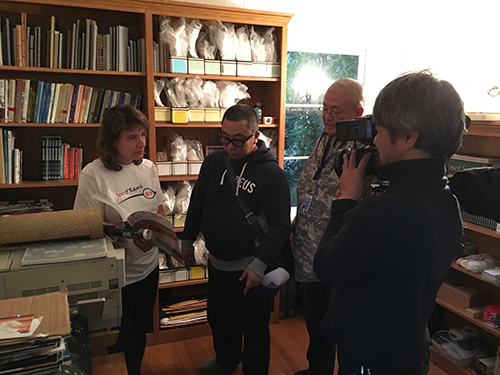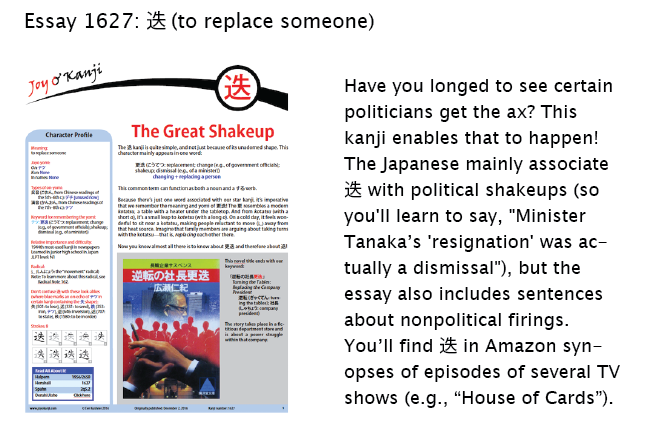Out of This World
The past week brought me kanji experiences that were out of this world!
Skywriting with Squid Ink
I checked out the movie Arrival with two friends. The plot revolves around a female linguist (how wonderful to see a brainy woman as the lead!) who is trying to communicate with octopus-like aliens that have arrived on Earth. She begins by teaching them English with a method that struck me as horribly flawed. First she holds up a sign that says "Human." Now, how could they know what that means? It could convey "Hello" or "Go away" or "Earth" or "Linguist." Her next sign bears her name, "Louise," which seems just as ill conceived.
Perhaps that's why she then focuses on decoding the aliens' script. Using their octopus legs, they create something like enso circles in the air, skywriting with a black substance resembling squid ink. The circles branch off into myriad fractals, each pattern a bit different.
"Aha!" I thought. "It's like decoding kanji when you're facing a tangle of strokes and have no idea where to begin." That's true even when you already know a thousand kanji. If you had never seen any characters and encountered the very first one, how would you ever go about decoding it? The question has long intrigued me, and the movie took that as its very subject matter!
Another part of the film also made me think of kanji. One character comments that the aliens' spoken and written languages don't match. That frustrated me. How could a human have any way of knowing whether the aliens' grunts and wheezing didn't correspond to the inky fractals? It might not seem to outsiders that a spoken Japanese word can correspond to a Chinese character, but it certainly can and does.
My friend and I had a spirited discussion about this on the way home. She knew nothing of kanji but guessed that it's not a phonetic script.
"Right," I said. "It's not like hiragana or katakana, which are purely phonetic. But that doesn't mean that kanji don't correspond to sounds."
She reiterated her point, and I reiterated mine, and we went nowhere.
Just now I tried to find the bit of movie dialogue in question, and instead I unearthed a great interview with a linguist who explains what the movie got right and wrong about her profession. Along the way, she addresses the mismatch between the spoken and written languages in the film, and by way of illustration, she mentions hanzi and kanji several times: "What I gathered is that the written form is not encoding the sounds of the spoken form, right? And certain dialects of Chinese are like that. They have these characters and the characters stand for a word or a concept, but a Chinese character isn’t made up of individual symbols that stand for individual sounds in the way that English does. In English, the word dog has a D and that corresponds to the sound duh. In Chinese, it’s not quite that way. Now I gather there is a phonetic aspect to Chinese, but largely Chinese uses logograms, where the symbol stands for the word. It doesn’t stand for a sound."
Wait... yes, it does! As she says, Chinese characters aren't phonetic in exactly the way that English is, but a character certainly carries and conveys a sound. (And this has nothing to do with dialects!)
Anyway, the aliens' writing system also reminded the linguist of kanji, and I feel some satisfaction in having been of like mind there.
Another Kind of Arrival
Just hours before I saw the movie, I received a call from a Japanese woman, informing me that a Japanese TV crew would be coming to interview me on December 4 at my house.
Excitement and surprise mingled with panic. December 4? It was already November 25. That didn't leave me much time to prepare.
That's okay because she soon called back and said, "Make it November 29."
Further contact ensued. The interview had shifted again. It would start on November 28 from 5 to 8, continuing the next morning.
Now the panic was real!
Monday came around, and at about 4:15 I received a call that they were running early and would arrive at 4:45.
They showed up at 4:30!
The crew had a Publishers' Clearing House arrangement that involved filming a lucky winner as that person answered the door. Because I wasn't remotely ready, my friend Sherry opened the door for them. They greeted her with excitement and captured her reaction, only to learn that it was a case of mistaken identity!
I then went to the door, and they tried the same thing on me, but I had to explain that I didn't yet have makeup on and wasn't ready for my big moment in the spotlight. I flitted away to the kitchen, where Sherry did a much better job with makeup than I'm capable of doing.
It all must have been pretty anticlimactic for the crew! But if so, they didn't show it. They were full of warm, focused energy from start to finish. And this was after having flown from Narita to Los Angeles, immediately taking another flight to San Francisco, driving into the city to pick up camera equipment, then crossing the Bay Bridge to find me at the far end of Berkeley. I cannot begin to imagine working under those conditions and listening intently to a foreigner talk for hours about one's own script!
The men marveled at what I showed them about the history of 缶 ((tin) can; container; steam boiler; kettle; "jar" radical) in essay 1095. They laughed and laughed at "Bloopers" in Crazy for Kanji (page 19), wherein the use of kanji homophones radically changes the meanings of sentences. And they taught me that you can write "lemon" not only as レモン but also as 檸檬, using two kanji that are practically impossible to draw. (Both are non-Joyo, and their readings don't match the yomi of the whole word, so this is an instance of ateji. You could also read the compound as ねいもう, using on-yomi for each kanji, but it's rare to do so.)
After the first session, they actually wanted a Japanese dinner, which pleased me because I always have the impulse to take Japanese visitors out for Japanese food, which is the last thing most of them want! We went to a nearby izakaya that they deemed authentic and excellent. (Whew!)
And after driving a half hour to a hotel that someone had chosen for them in Oakland (why?!), they were back at my house at 8:30 a.m. Again I didn't have makeup on yet! And then I offered them coffee but asked one of them to make it because I'm hopeless with such tasks!
I'm usually alone with my computer and my thoughts, so having three people near me as I explained my work in detail was quite a departure. In particular, I've never had native speakers plumb the depths of my passion for kanji, and not for two days, and especially not in my home!
Connecting with native speakers around kanji fills me with joy from top to bottom! Japanese people don't always care that much about the topic, so when I'm talking to them and a kanji issue catches their attention or makes them stop to wonder, and especially when our conversation prompts them to break out with a heartfelt へえええええ!!!, it's a magical moment for me!
Here are a few shots from those two days, all courtesy of Sherry Daniel, without whom none of this would have happened.




A New Essay
I've been so wrapped up in describing these otherworldly experiences that I've neglected to discuss kanji in any detailed way. I'll do so next week. In the meantime, I'd like to introduce the newest essay:

Have a great weekend!

Comments